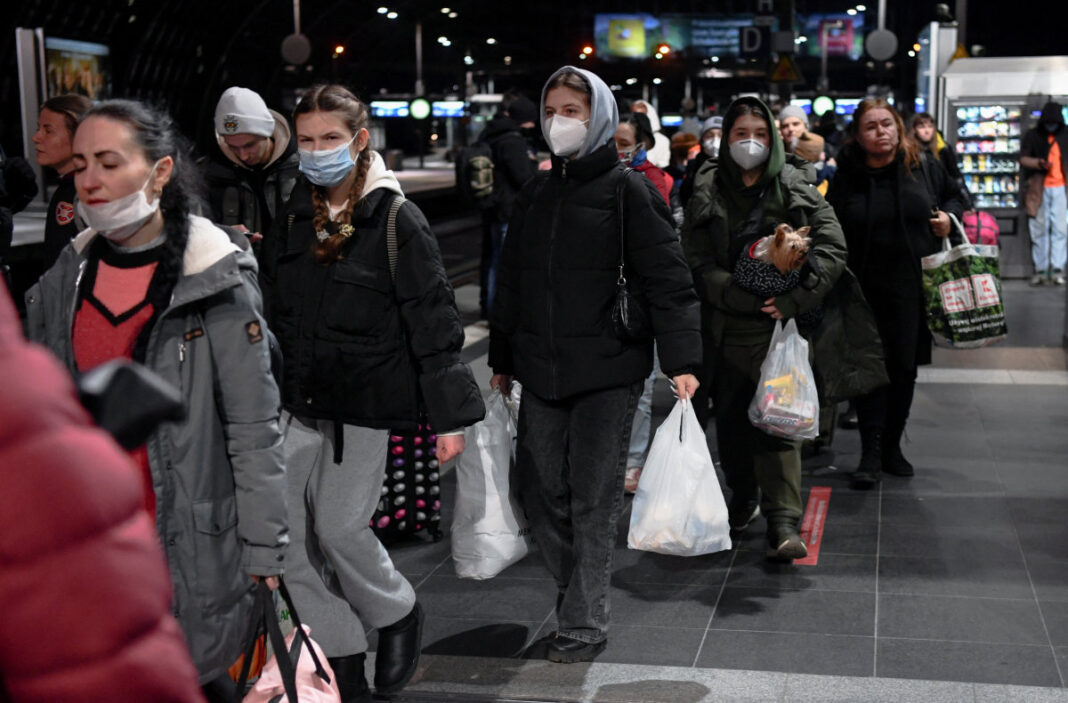JEDDAH: More than 1.5 million refugees from Ukraine have crossed into neighboring countries in the space of 10 days, the fastest growing refugee crisis in Europe since the Second World War, UN High Commis/sioner for Refugees Filippo Grandi said on Sunday.
His concern came as Russian President Vladimir Putin said his campaign in Ukraine was going to plan and would not end until Kyiv stopped fighting, as efforts to evacuate 200,000 people from the heavily bombarded city of Mariupol fell apart for a second day in a row.
Most people trapped in the port city are sleeping in bomb shelters to escape more than six days of near-constant shelling by encircling Russian forces that has cut off food, water, power and heating supplies, according to the Ukrainian authorities.
The civilian death toll from hostilities across Ukraine since Moscow launched its military assault on Feb. 24 stood at 364, including more than 20 children, according to the UN on Sunday, with hundreds more injured.
The UN High Commissioner for Human Rights said most civilian casualties were caused by the use of “explosive weapons with a wide impact area, including shelling from heavy artillery and multi-launch rocket systems, and missile and air strikes.”
Moscow has repeatedly denied attacking civilian areas.
In Irpin, a town some 25 km northwest of the capital Kyiv, men, women and children trying to escape armed clashes in the area were forced to take cover when missiles struck nearby, according to witnesses.
Soldiers and fellow residents helped the elderly hurry to a bus filled with frightened people, some cowering as they waited to be driven to safety.
The military offensive has drawn almost universal condemnation around the world.
“War is madness, please stop,” Pope Francis said in his weekly address to crowds in St. Peter’s Square, adding that “rivers of blood and tears” were flowing in Ukraine’s war.
Putin made his demand for Kyiv to end the fighting in a phone call with Turkish President Recep Tayyip Erdogan, who appealed for a ceasefire.
Putin told Erdogan he was ready for dialogue with Ukraine and foreign partners but any attempt to draw out negotiation would fail, a Kremlin statement said.
Russian media said Putin also held almost two hours of talks on Sunday with French President Emmanuel Macron. Macron told Putin he was concerned about a possible imminent attack on the southern Ukrainian city of Odessa.
Anti-war protests took place around the world including in Russia itself.
Poland welcomes fleeing neighbors
Faced with the influx of a million refugees fleeing Russian troops in Ukraine, Poles like Nicolas Kusiak, a 27-year-old manager, have rallied in an ever expanding humanitarian response.
They have taken in refugees, offered food and transport and above all a little human kindness to the distraught and traumatized women and children who have had to leave their men folk behind to fight.
People fleeing the Russian invasion of Ukraine board a bus after crossing the border in Medyka, Poland, on March 6, 2022. (REUTERS/Fabrizio Bensch)
“It’s beginning to get organized,” Kusiak told AFP near the Medyka border post — a frequently clogged crossing point near the Ukrainian city of Lviv.
Kusiak, a Pole born in France who speaks several languages, has been helping as a translator ever since he arrived at the border four days ago.
He also brought tents, generators, heaters and food with him from Warsaw and has tried to coordinate police, doctors, firefighters and the volunteers doling out hot soups — a daunting challenge.
“Everyone is trying to do everything,” he said.
The government has set up reception centers and charities up and down the country have mobilized in a massive aid effort, helped by the estimated 1.5 million Ukrainians already living in Poland. Polish border guards on Sunday said the number of people crossing since Russian troops advanced into Ukraine on February 24 had reached a million, saying this was “a million human tragedies.”
People fleeing the Russian invasion of Ukraine get shelter inside a tent after crossing the border to Medyka, Poland, on March 6, 2022. (REUTERS/Fabrizio Bensch)
At the main train station in Krakow in southern Poland, a temporary reception center has been set up and hundreds could be seen arriving.
The reception center “is really full and we have lots of people here all the time…. We don’t have enough places,” said volunteer Anna Lech, 45.
But Maja Mazur, another volunteer, said spaces were being offered in the city where refugees could have some food, a hot drink and “stay for a day or two.”
Many are continuing their journeys on to western Europe.
“I came from Kharkiv with my family, with my two sons and my parents,” said Anna Gimpelson, an architect from the frontline city of Kharkiv.
“Our city is going through really awful times. We have bombs everywhere and our neighbor’s house doesn’t exist any more,” she said.
“For three days we were on the road and now are going to my friend’s in Dusseldorf. Maybe we will spend some time there and think what to do next.”
“Our main challenge today is to prepare infrastructure to be ready to take in a wave of refugees whose size we cannot predict,” said Michal Dworczyk, a top Polish government official.
The Polish branch of Amnesty International meanwhile appealed on Facebook for Poland not to forget about migrants from the Middle East who are still stranded between Belarus and Poland.
It called the unequal treatment of foreigners based on their nationality a “massive injustice.”




